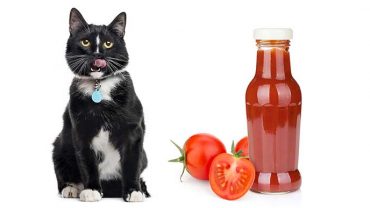In most modern societies, condiments such as ketchup have become a normal addition to many of our meals.
As such, it’s normal to wonder if our beloved pets can eat our condiments as well and the question of “Can cats eat ketchup?” is actually a pretty common one.
The simple answer to that question is…no.
Strictly speaking, cats can ingest a small amount of ketchup and they shouldn’t immediately get sick from it.
However, ketchup has a high quantity of ingredients and that can be very harmful to cats, so cats definitely should not be eating ketchup on a regular basis.
Table of Contents
Why Ketchup is Harmful to Cats
So if you came here because you wanted to know the answer to the question “Can cats eat ketchup?”, then you’re probably now wondering why cats can’t have ketchup.
1. Onions and Garlic:
One of the main reasons for this is because most kinds of ketchup have a lot of garlic and onion powder in them.
Garlic and onions in any form are extremely toxic to cats, and can damage the cats’ red blood cells. Long term, this damage could cause your cat to develop a specific type of anemia called “Heinz body anemia”.
This type of anemia can be life threatening to your cat, and its symptoms include fever, fatigue, loss of appetite, discolored urine, shortness of breath, and a notable paleness in the skin, lips, and gums of the cat.
If you see these symptoms develop in your furry friend, make sure to get them to a vet immediately.

In addition to the possible long term effects, exposing your cat to the garlic and onion powder in ketchup can have a number of short term effects as well.
Short term, prolonged exposure to these ingredients can cause your cat to become lethargic, weak, and to have a reduced appetite.
Although the presence of onion powder and garlic are the main reasons cats shouldn’t have ketchup, there are other ingredients in ketchup that can be harmful to your cat as well.
Last update on 2025-01-30 / Affiliate links / Images from Amazon Product Advertising API
2. Salt and Acid:
Salt, which is another primary ingredient in ketchup, is something else that cats shouldn’t have because it will cause them to develop dehydration very quickly.
If your cat eats something that has large amount of salt in it, it’s going to have to drink a lot of water to rehydrate itself. If a cat drinks too much water, this cause them to get temporarily sick or even vomit.
Along with that, if your cat consumes too much salt, it can develop what is called ‘hypernatremia’.
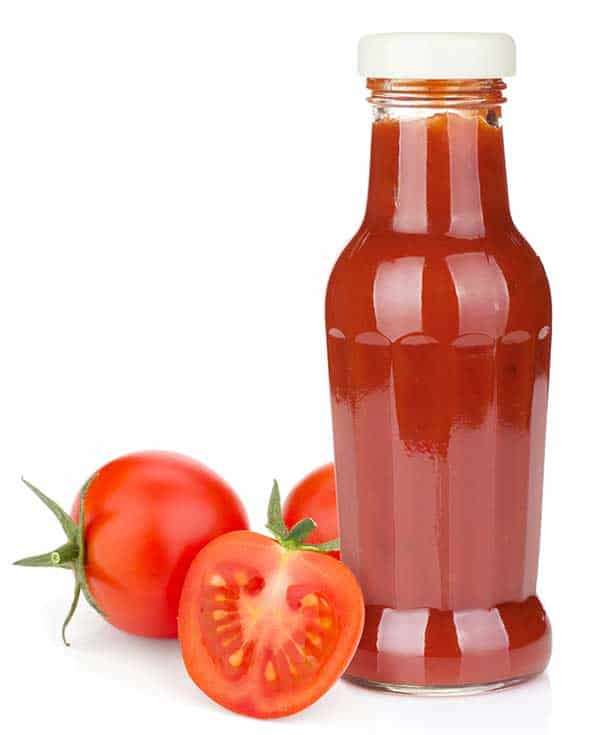
Hypernatremia is more commonly known as salt-poisoning, and symptoms of this can include diarrhea, vomiting, extreme thirst, low energy, swelling of the body parts, loss of apetite, loss of motor coordination or stumbling, and even tremors or seizures.
If it isn’t treated by a vet, hypernatremia can cause your cat to have permanent kidney damage or even die.
Along with salt, most types of ketchup are highly acidic, and if your cat has too much acid this could also cause it to have gastro-intestinal problems.
3. Other Things in Ketchup That You’re Cat Won’t Like:
Aside from the more primary ingredients, all types of ketchup have been significantly processed and a number of synthetic chemicals have been added to them.
Most of these chemicals aren’t really healthy for humans, and they’re definitely not good for your cat.
Corn syrup and sugar are also frequently added to ketchup and, although they aren’t toxic to cats, these ingredients can cause cats to develop health problems such as obesity.
In addition, cancer and a number of other diseases that cats can develop are known to thrive on sugar. As such, if your cat has any health complications, giving them ketchup could exacerbate their conditions.
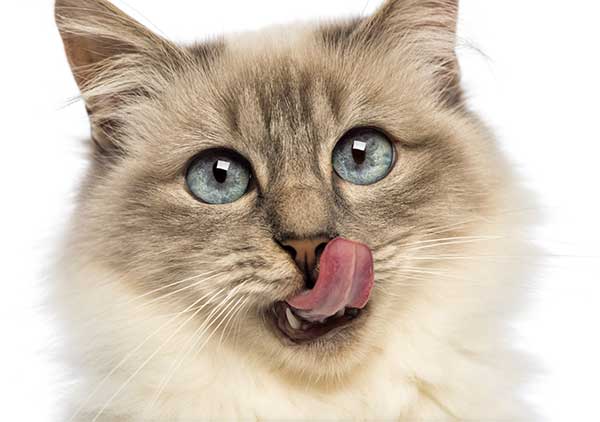
What Should I Do If My Cat Eats Ketchup?
Although cats should really just stay away from ketchup altogether, cats are curious creatures and some (well…most) of them may like to try the foods that you’re eating.
If you get into a situation where your cat licked ketchup from something you’re eating, don’t panic.
Ketchup in very small quantities won’t harm your cat, so just make sure you prevent your cat from continuing to eat the ketchup and, preferably, take the ketchup away from them.
If you think your cat may have eaten a lot of ketchup, there are some symptoms that you can watch for which will tell you whether or not your cat has been affected.
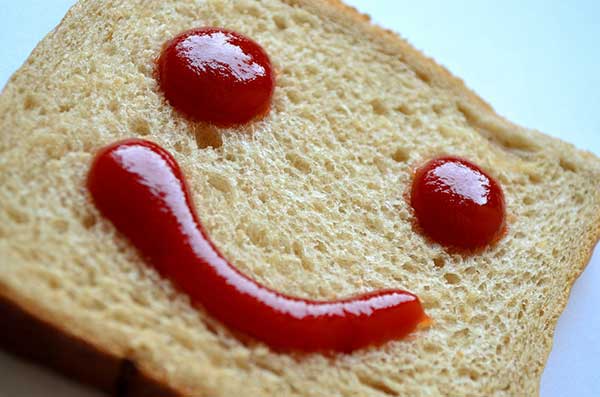
Symptoms of ketchup-poisoning in cats mainly consist of gastro-intestinal irritation, diarrhea, dilated pupils, and a notable loss of appetite in which your cat won’t eat like it normally does.
In general, if cats or dogs have some type of stomach or intestine problem they tend to start chewing on really green plants or grass to try to help themselves feel better.
So if you notice any of these symptoms after your cat licked all of the ketchup off of your french fries, definitely take them to the vet as soon as you can.
- PETKIT Automatic Cat Dog Feeder Dispenser for dog cat Pets
Last update on 2025-01-30 / Affiliate links / Images from Amazon Product Advertising API
Can Cats Eat Tomato? Why or Why Not?
When people ask “can cats eat ketchup?”, the next question that normally comes to mind is whether or not cats can eat the main ingredient of ketchup: tomatoes.
In general, ripe tomato fruits are not harmful to cats and can be eaten by them.
However, if your cat has a low tolerance for acidic foods or a low tolerance for fiber, then they probably won’t be able to eat tomatoes either because they are high in both acid and fiber.
Although the tomato fruit itself can be eaten by cats, the same cannot be said for the rest of the tomato plant. The leaves and stem of a tomato are highly poisonous to a cat and if you see your cat eating them, you should stop them immediately.
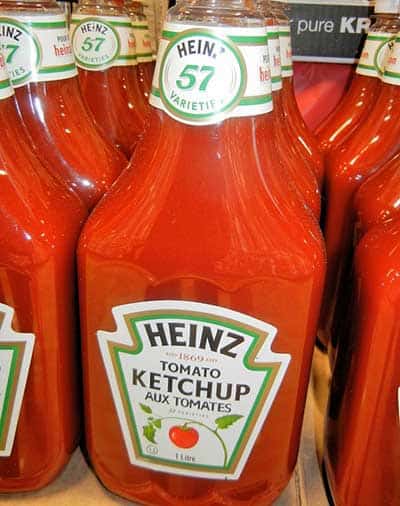
Similarly, unripe tomatoes are just as harmful to cats so they can’t eat them either.
Along with ketchup, other tomato-based products, such as tomato soup and prepackaged tomato juice, should not be eaten by cats because they can have effects similar to ketchup.
So, although we humans like to eat a lot of ketchup and can get away with it, your furry friend will likely not take it as well as you do.

